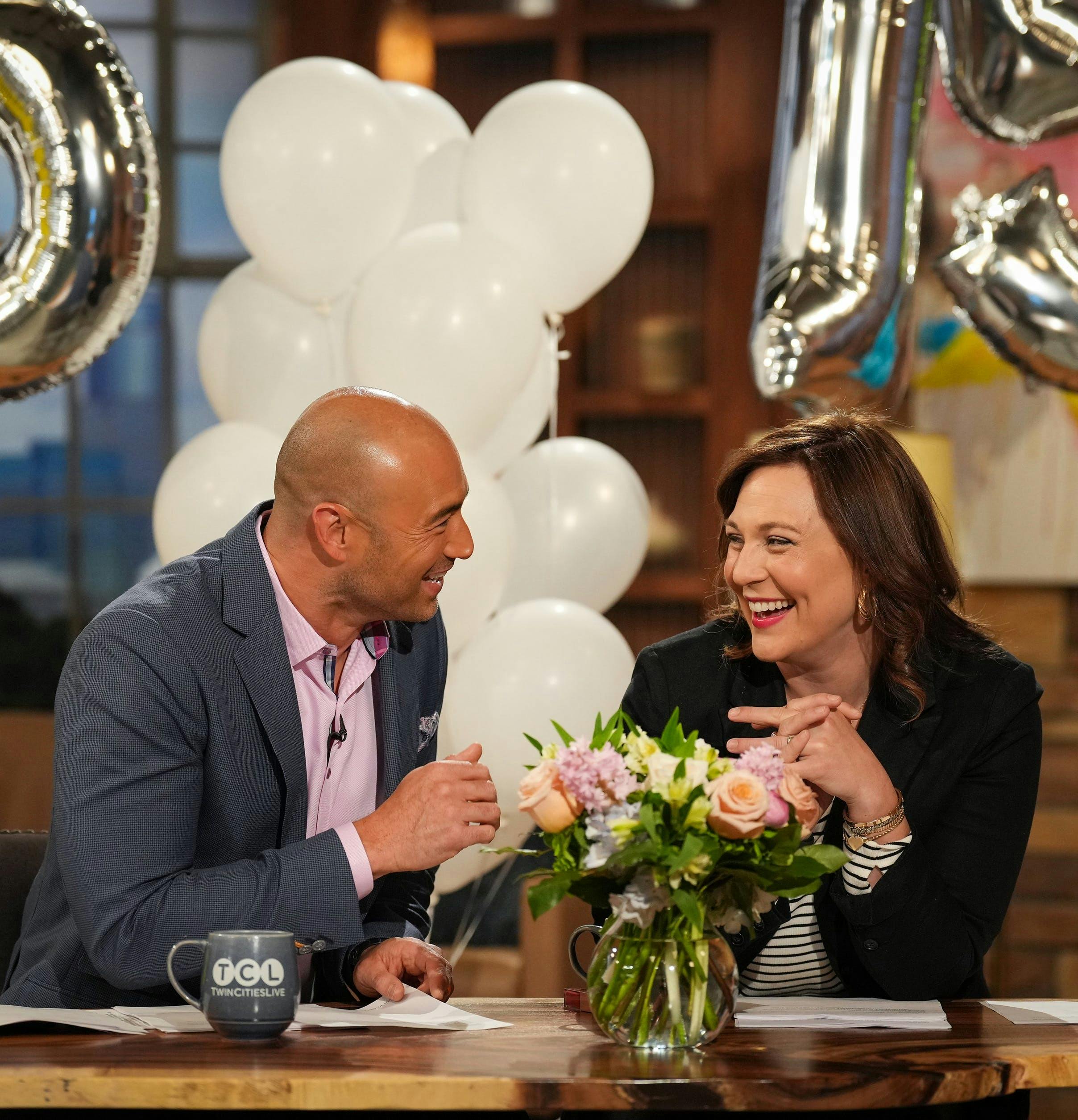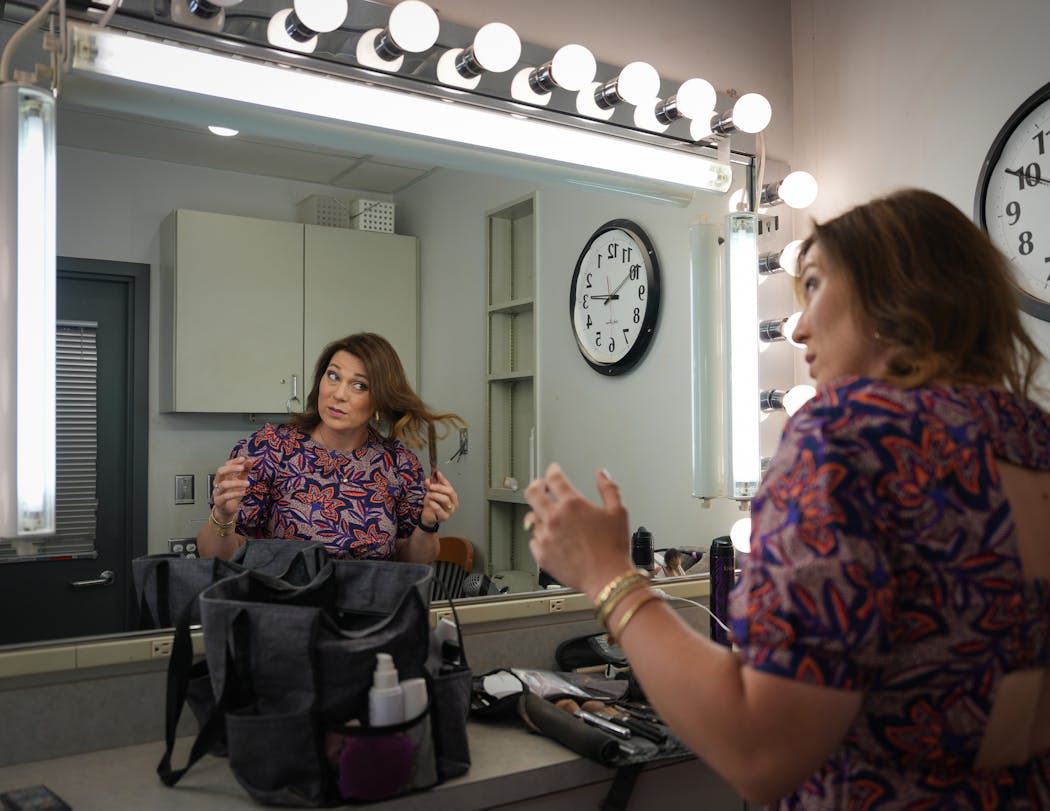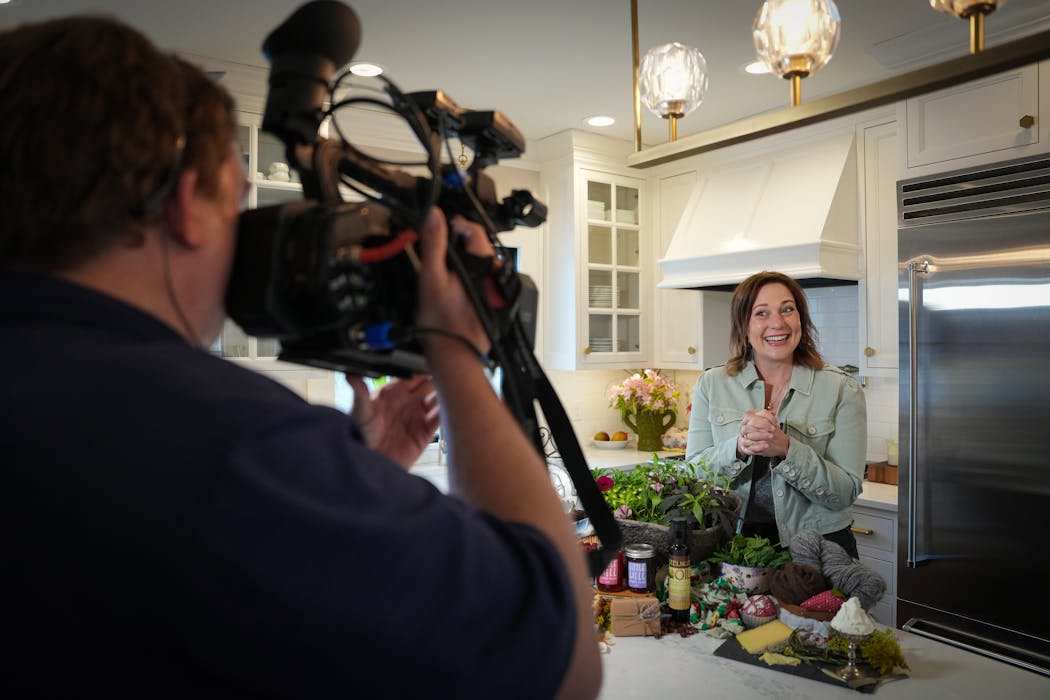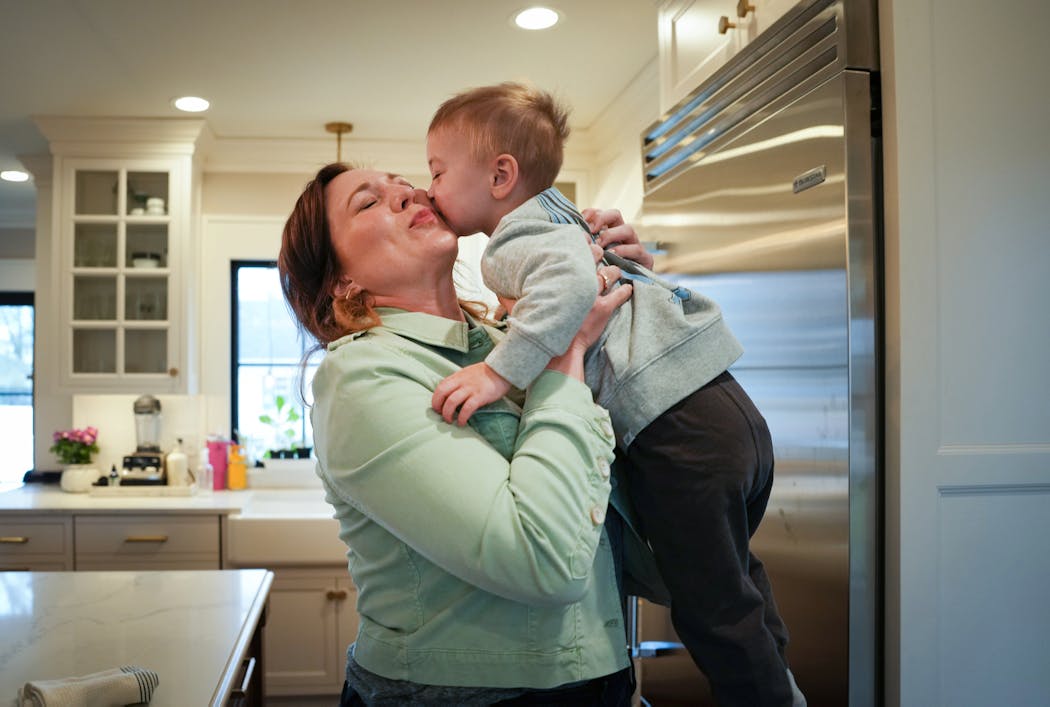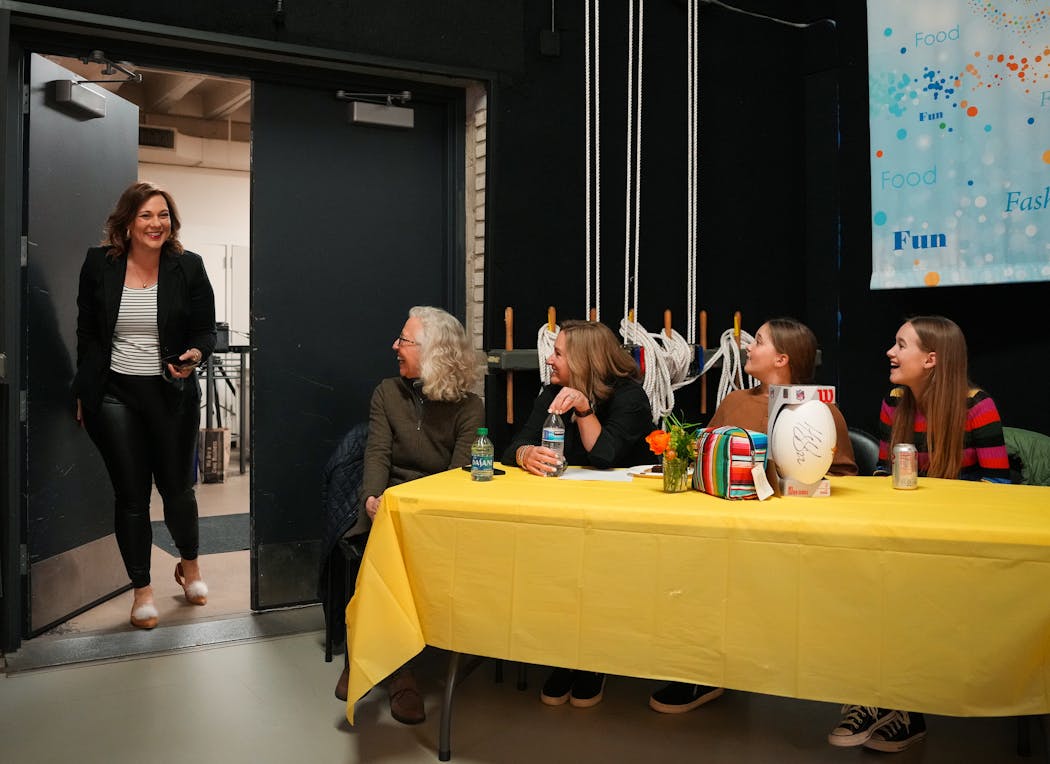t's minutes before 3 p.m. at KSTP's St. Paul studio, and the cameras are about to roll. But Elizabeth Ries, co-host of "Twin Cities Live," is still in the green room, touching up her buoyant brown locks.
"TCL" as it's known by fans, just celebrated its 15th anniversary, and Ries, 41, has been its smiling face from nearly the beginning. Doing the 1½-hour show five days a week has become almost muscle memory. She knows she can make the short walk to the set in a few seconds — an eon in television time.
But back in 2009, her first day on the show, Ries was a bundle of nerves in her bright shift dress and blunt bob cut, the standard TV uniform of that era. It didn't help that her colleagues perceived the show as less important than news.
"Everybody thought, 'This is a cheesy local show that's not going to go anywhere,' " Ries recalled.
Since then, "TCL" has become the most-viewed local TV show, outside of newscasts, outranking other personality-driven broadcasts such as Fox's "The Jason Show" and WCCO's "Mid-Morning." And few Twin Cities TV broadcasters have spent as much time on one show as Ries, who is now on her fourth male co-host.
In a way, audiences have watched Ries grow up on air. She started with "TCL" as a late twentysomething with a new fiancé. She's now married (to a different guy, for nearly a decade) and a parent of three. All that she went through in between — a broken engagement and miscarriage included — viewers went along with her.
Ries exudes the same warmth and vibrancy in person as she does on-air. And although "TCL"'s content is mostly light, she's not afraid to go deep. On the show, her social media accounts, and especially her podcast, Ries reveals much more of herself and her personal life than do most TV personalities. Among high-profile working moms, she's one of the few who speaks regularly, and frankly, about the challenge of juggling her career responsibilities with those to her husband and three young kids.
"Let's be honest, it can't all be hunky dory and kumbaya every second of every day," her "TCL" co-host, ex-NFLer Ben Leber, noted of Ries' life. "She's willing to share some of those down moments. I think that's what makes her lovable."
Some Twin Cities newcomers feel such a profound, if virtual, bond that they call Ries and her co-host their "first friends." But Ries also has been heavily criticized on social media — for her clothes, her weight, her hair, her voice, her toddler being outside without a coat for a minute.
"The access is excessive," she said. "I have to constantly be working on boundaries."
In the spotlight early
Ries spent most of her childhood in Apple Valley, with her parents and two younger sisters. Their father was a Lutheran minister, which Ries credits with laying the groundwork for her current role.
"Growing up as a pastor's kid was definitely major preparation for my life now," she said. "It's sort of a mini version of being a public figure. If I was sitting in church and my dad was telling a story about us, everybody would turn and look."
As an extrovert, Ries embraced the attention, unfazed by its attendant lack of privacy. "It doesn't feel strange to me to have people interested in stories about my life, or to have people watching," she said.
At 13, Ries was watching the TV news and thought: "I could do that." By high school, she'd lined up Amelia Santaniello as her mentor.
After college at University of Wisconsin in Madison, Ries worked as a reporter for TV stations in Duluth and Green Bay. By the time she joined KSTP, Ries realized that she didn't share her colleagues' zeal for breaking news.
"I remember looking around and thinking, 'I'm not getting the same thing out of this as these guys are getting.' "
KSTP had just launched "TCL," and Ries started reporting for the show and filling in as co-host. Soon she was offered the permanent gig.
Making connections
Hosting "TCL" is mostly improvising — something that Ries makes look easy. While roughly 90% of a news anchor's words come from a teleprompter, the "TCL" hosts have only a few bullet points to go on. ("TCL" is also not journalism. About half of its segments are sponsored content.)
Ries and Leber chat with guests about everything from the psychology of self-forgiveness, to interior design trends, to hog farmers hosting Tupperware-style direct-sales parties. While the show offers viewers tips about what to eat, wear and do, it's also a crash course in getting to know the community.
"I want to celebrate our community and I want people to feel connected," Ries said.
One way she does so is by openly sharing stories from her life. And because she was an influencer long before Instagram, her approach feels distinct from an online personality/pitchwoman or a confessional mommy blogger.
Her tendency to broach friends-only topics makes viewers feel welcomed into her circle. She often turns to the audience and says, "If you have Jay's number, don't text him" — as if they might have her husband on speed dial — before dishing an embarrassing anecdote.
Ries' stories aren't always pretty, especially on her podcast, "Best to the Nest," which she records with her former FM 107 radio co-host Margery Punnett. The topics often revolve around creating a strong foundation for their marriages and children while making sure their needs don't get lost.
"We wanted it to be a conversation that other women could listen to and feel as if they were standing in the room with us," Punnett said.
So when the longtime friends chat about family arguments, for example, Ries cops to having once been so angry that she rolled up an area rug and threw it down the stairs.
While Ries' love for her husband is deep, the rage was real. And Ries can share it, it seems, because she's established trust with her fans. And maybe they've been there, too.
Arik Hanson, a local social media consultant versed in the power of personalities, said Ries' approach aligns with audience desires.
"The real uppity, kind of high-level influencer — that used to be what was popular in the initial phases of influencer marketing," Hanson said. "But now, what Ries is doing is what's working. People don't want that perfect stuff at all anymore. It's all about authenticity."
Still, Ries has learned that the more you share, the more you open yourself up to personal attacks.
"I think the number one thing to be successful in a job like this is you have to be really secure in who you are and very much OK with showing your authentic self," Ries said. "And that's a scary thing. It comes with a lot of vulnerability."
Fat shaming, barfing emojis
While Ries welcomes constructive criticism about her job performance, the cruel, personal comments are the most difficult part of the job, "no question."
A barfing emoji comment is easy to shrug off. Less so is: "I was so embarrassed for you. ... Either start working out or wear much longer shirts that cover your butt."
Ries decided to share that particular message broadly, including with People magazine and on Kelly Clarkson's talk show, to raise awareness about how body shaming increases the risk of eating disorders.
Her male co-hosts readily acknowledge that female broadcasters are burdened with more inappropriate, often sexist comments. Though Ries and Leber are both parents of three, she's the one who's told by viewers: "It's time for Elizabeth to be a mother to her children." Or she's dinged for being assertive — "Elizabeth comes across as having to be in charge. …" — despite the fact that, well, she is in charge.
Her response to such comments has evolved.
"In my 20s, I was so mortified," she said. "I internalized so much shame that I couldn't even talk about it. When people would send letters or emails early in my career, my face would just get red reading it. In my 30s, I would try to fight back to stand up for the principle of it, and kind of be like, 'You don't get to treat me that way.' "
But in her fourth decade, Ries realized how much emotional energy those reactions sapped.
"It's not that I don't care as much, but my attitude is like: 'If you're a person who will take the time and the energy to send that type of message, all is not well and good with your soul.' I just have to send a little silent prayer for peace for people like that."
And what should we expect from her 50s? "I'll probably just swear," Ries says with a laugh.
Fortunately, the number of hateful comments pales in comparison to the laudatory ones.
"When people say, 'I feel like you're my friend.' I think that's a super high compliment," she said. "You realize you're part of the fabric of someone's life."
Juggling two families
At this point in her career, Ries' biggest challenge may be juggling the needs of her actual family so she can make viewers feel like she's a part of theirs.
Ries describes how often, when both parents work, men take the role of family "CEO" and women as middle managers, overseeing the kids and bearing the brunt of the emotional labor.
If her children's nanny is sick, for example, Ries is the one who gets the dreaded text and puts a backup plan in place while driving to the studio, even though Jay is working from home, and she needs to be on live television in a matter of hours. (The downside of marrying a former high-level athlete, she notes, is that the narrow focus that made Jay a successful hockey player doesn't translate well into managing competing interests.)
"Sometimes I think, 'It's so much work to work,' " she reflects, before reminding herself that, as her children grow up, life will feel less chaotic.
For now, it helps to focus on the fans, such as the winners of the "Ultimate TCLer" anniversary contest. One viewer had watched "TCL" since its first episode, calling the show a "pillar of my life." Another shared pages of notes she'd taken while watching, lists of places to visit, recipes to make, etc. ("This looks obsessive," she admitted.)
One fan went so far as to compose a song expressing what the show means to her.
What will today bring, "TCL"?
When we're together living well.
We've got a place to be.
We've got a family.
We've got a home right here.
We've got a friend so dear.
So just tune in.
Just tune in.
What other local broadcaster has that?

